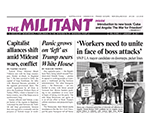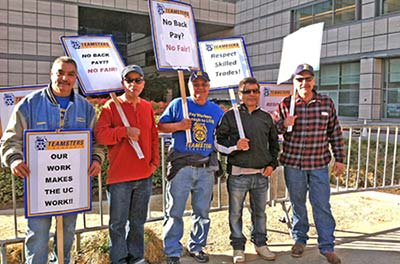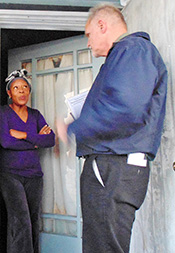“You’re facing what a lot of workers confront,” said Richter. “Bosses delay and delay on contracts knowing that workers are losing every day.” The strikers are the skilled trades workers — plumbers, carpenters, electricians, elevator repair people, and other facilities workers — who work at UCLA and UCLA’s medical center. Local 2010 represents some 600 workers there, and 200 more at University of California at San Diego.
Kramer said they are asking for a graduated scale of payments, depending on years worked, to make up for lack of raises over four years — from $7,000 for those with over four years on the job to $1,000 for those with a year. “But management is offering only $1,200 to $1,500 for those with four years and more, and nothing for those with a year,” he said.
“They’ve delayed the negotiations and are retaliating against our members,” he said, citing examples of harsh disciplinary action being taken against unionists. “I had to defend two different workers, both misplaced their keys, both reported it immediately and said they would retrace their steps. In both cases the keys were found and turned in the same day. But instead of going through the different disciplinary steps, a warning first, etc., both were immediately suspended.”
“I’m here to give solidarity and to learn more about your fight so I can build support, and to explain how it will take more workers standing up for ourselves to take on the bosses’ attacks,” said Richter. Strikers plan to keep their picket line up for five days, and thousands of clerical workers at the university are organizing to join them Jan. 10 in a one-day solidarity strike. Richter said he would urge other workers to join the rally.
“I have an interview with the Los Angeles Times editorial board later that day,” he told Kramer. “I’ll come here first and then use the interview to explain the issues in your fight and call for support.”
“I’m running not because I think voting for me will change something,” Richter told several workers on the picket line as they discussed the bosses’ assaults on workers’ rights and standard of living. “The history of working-class struggle teaches us that all big questions facing working people, from wages and working conditions to war and cop brutality, are solved in the streets, not at the ballot box. I’m running because I want to talk with workers about how to build a movement that can bring solidarity with fights like yours and build up confidence in the capacity of workers to organize and fight for our interests, not depend on politicians from the twin parties that represent big business, the Democrats and Republicans.”
A number of workers wanted to talk about the rising cost of health care and how employers and the government are pressing to make workers shoulder more and more of the burden.
“The problem is it remains a for-profit commodity, sold on the basis of making rich the insurance companies, the pharmaceutical companies and others,” Richter said. “Obama never touched this, he just guaranteed a big payout to the insurance companies. We need to remove health care from being a commodity. We need to fight for universal health care paid for by the federal government as a basic right for all who live and work here.”
“My party organizes to visit workers on their doorsteps throughout the region and the country,” Richter said. “Workers everywhere are discussing these challenges, trying to find an effective way to change things. We say there are two classes and three parties, and the SWP is the workers’ party.”
“The bosses won’t give up on their attacks, we will face more, and we have to get more prepared to fight back,” Richter said. “In the end we need to fight to change this from being a system run by and for the ruling rich to one run by and for those who work, from the factories to the fields.”
A couple of strikers wanted to know more about the ideas Richter raised and picked up copies of the Militant.
For more information on the Socialist Workers Party, contact the party branch in your area listed in the directory on page 8.
|
Printer-friendly version of this article |








 click here for information and literature from the Socialist Workers Party 2016 campaign
click here for information and literature from the Socialist Workers Party 2016 campaign a magazine of Marxist politics and theory from 1934 to the present
a magazine of Marxist politics and theory from 1934 to the present an international news magazine published from 1963 to 1986
an international news magazine published from 1963 to 1986 issues of the monthly Spanish-language socialist magazine from 1999 to 2005
issues of the monthly Spanish-language socialist magazine from 1999 to 2005





